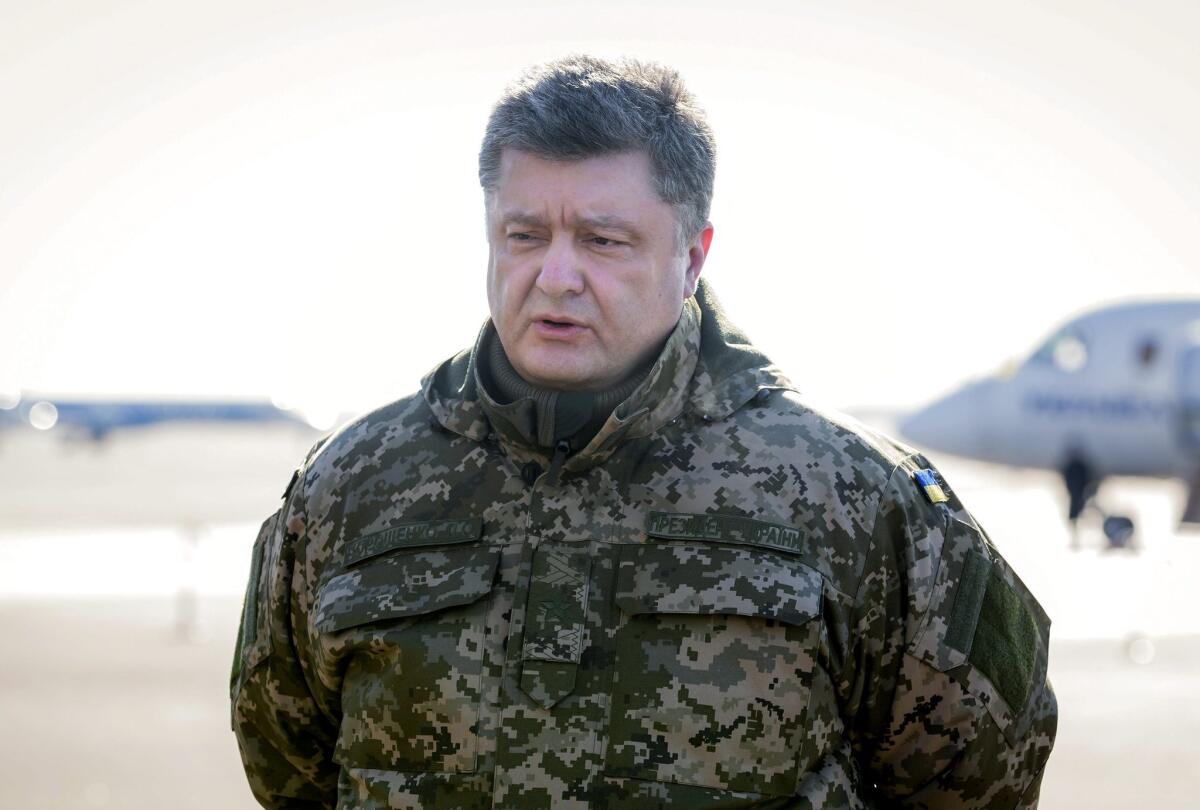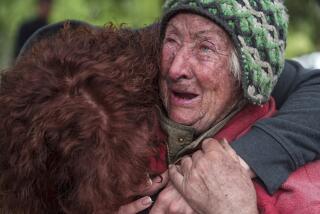Ukraine forces cede Debaltseve rail hub to separatists

- Share via
Reporting from Artemivsk, Ukraine — Exhausted and demoralized, Ukrainian soldiers stumbled out of an embattled railway junction town in eastern Ukraine on Wednesday after Kremlin-backed separatists captured the vital transportation hub and raised the Russian flag over its artillery-pocked commercial center.
The retreat from Debaltseve, though cast by Kiev authorities as strategic, marked the latest setback in the Ukrainian government’s yearlong battle against insurgents who they say are armed and instigated by Moscow. Loss of the railhead cedes an important asset to the separatists, as it connects their two strongholds in Donetsk and Luhansk and moves the de facto front line deeper into government-held territory.
The separatist victory was accomplished under cover of a Feb. 12 cease-fire agreement that was supposed to halt all hostilities early Sunday but didn’t. European leaders who brokered the deal criticized the violations but were powerless to force compliance.
Russian President Vladimir Putin last week endorsed the peace plan along with the leaders of Germany, France and Ukraine in the Belarusian capital, Minsk, apparently with an eye to freezing the status quo of massive disruption of Ukraine’s industrialized east and distracting from Kiev’s efforts to undertake economic reform and fight corruption.
The war in eastern Ukraine was sparked by Russia’s seizure of the Crimean peninsula a year ago, after a pro-Europe rebellion that ousted Ukrainian President Viktor Yanukovich, a compliant Kremlin ally who had been doing Putin’s bidding in blocking Ukraine’s drift toward the European Union and North Atlantic Treaty Organization.
Ukrainian soldiers in Debaltseve, recently reinforced to 8,000-strong, had maintained a weakening hold on the shattered and evacuated town until Wednesday, when the Kiev government gave in to a separatist ultimatum for the surrounded troops to leave or face capture. Putin, during a visit Tuesday to Budapest, Hungary, urged Kiev leaders to withdraw their soldiers to avert a bloodbath.
Six government soldiers were killed during the retreat and more than 100 wounded, Ukrainian President Petro Poroshenko said at a meeting of the National Security and Defense Council.
Poroshenko said in televised remarks that 80% of the government’s troops had been pulled back from Debaltseve “in a planned and organized manner with all the heavy weaponry.”
But the scene on the road from Debaltseve into neighboring Artemivsk told a different story.
As Ukraine’s 128th Mechanized Brigade made its arduous retreat early Wednesday, separatists fired at their backs, killing and injuring an untold number, survivors told journalists as they staggered to relative safety.
Dozens of soldiers with a tank unit convoy were headed to first-aid stations for treatment of their wounds. Others told of leaving behind dead comrades and those who had gone missing.
“We gave the ‘seps’ a hell of a beating with this gal,” Ivan, 34, from the western city of Uzhgorod, said of the defense put up with a howitzer tank that broke down as it entered Artemivsk. “But look … our equipment is old. She was made in the 1970s. They had more ammunition and more modern stuff.”
Ivan, who would give only his first name to spare his family further worry, said his brigade had been fighting in Debaltseve for five months. The last month had been endless days and nights of blasts from Grad rockets, tanks and other heavy artillery raining down around them and destroying most of the city.
Only about 3,000 civilians remained in the city, nearly all of them staying in basements with no power or water and little food. Wounded soldiers couldn’t get out, and any attempt to resupply the unit from outside the separatists’ cordon would have been a death trap, Ivan said.
Another retreating soldier, Ihor, said the railway junction was destroyed in the fighting that was so intense last week that dozens were killed and hundreds wounded on both sides. The hard-won rail hub will be unusable for the foreseeable future, he said.
Soldiers with the 169th Battalion, a conscripted group from the northern city of Chernihiv, said they had started out from Debaltseve early in the morning after getting orders from their commander, a short, stocky man who goes by the nom de guerre Crazy Daddy.
The commander had lost his voice after weeks of shouting over the sound of shelling. His troops had been surrounded for days and had to make their way out on foot through woods and mined farmland, he said in a raspy, hushed voice. They had no radios to call for help. Eventually, they met up with other government troops and made their way over the more than 12 miles of road leading to Artemivsk.
A dozen of the men rested on the roadside with their packs and Kalashnikovs. Many seemed unsure what their next move would be, but there seemed to be little regret that they were out of Debaltseve.
“There’s no need to discuss it,” the commander said with a dismissive wave when asked whether the retreat from Debaltseve represented a major loss. “We just want peace, that’s it.”
Russia’s state-run Channel One television showed separatists hoisting the Russian tricolor over a multi-story building in Debaltseve’s center, as well as images of captured government soldiers being escorted out of town by the gunmen.
Maj. Gen. Alexander Rozmaznin, Ukraine’s envoy to the joint cease-fire monitoring mission of the Organization for Security and Cooperation in Europe, said the government troops were out of Debaltseve by day’s end and awaiting redeployment “to continue the defense of our motherland from new positions.”
The National Defense and Security Council decided to appeal to the United Nations to send a peacekeeping mission to eastern Ukraine.
Poroshenko said Moscow failed to get its rebel proxies to abide by the cease-fire and was responsible for the continued fighting that prevented both sides from pulling back heavy weapons from the front lines as of Tuesday, a key provision of the Minsk accord. The Ukrainian president said he had demanded a firm reaction from the international community to “Russia’s brutal violation of the Minsk agreements.”
NATO Secretary-General Jens Stoltenberg called on Russia “to end support for the separatists and to withdraw forces and military equipment from eastern Ukraine,” as prescribed by the Minsk peace plan.
The European Union’s foreign policy chief, Federica Mogherini, also accused the separatists of taking Debaltseve “in clear violation of the cease-fire.”
“Russia and the separatists have to immediately and fully implement the commitments agreed to in Minsk, in line with yesterday’s U.N. Security Council resolution, starting with the respect of the cease-fire and the withdrawal of all heavy weapons,” she said in a statement.
But with the Kremlin’s proxies now securely in control of the territory they occupy in Ukraine’s east and well positioned to make a drive for the next strategic asset, the Black Sea port of Mariupol, the Western warnings seemed to hold out little prospect of getting Russia or the separatists to reverse course.
Special correspondent Ayres reported from Artemivsk, and Times staff writers Loiko and Williams from Moscow and Los Angeles, respectively. Special correspondent Victoria Butenko in Kiev contributed to this report.
More to Read
Sign up for Essential California
The most important California stories and recommendations in your inbox every morning.
You may occasionally receive promotional content from the Los Angeles Times.














